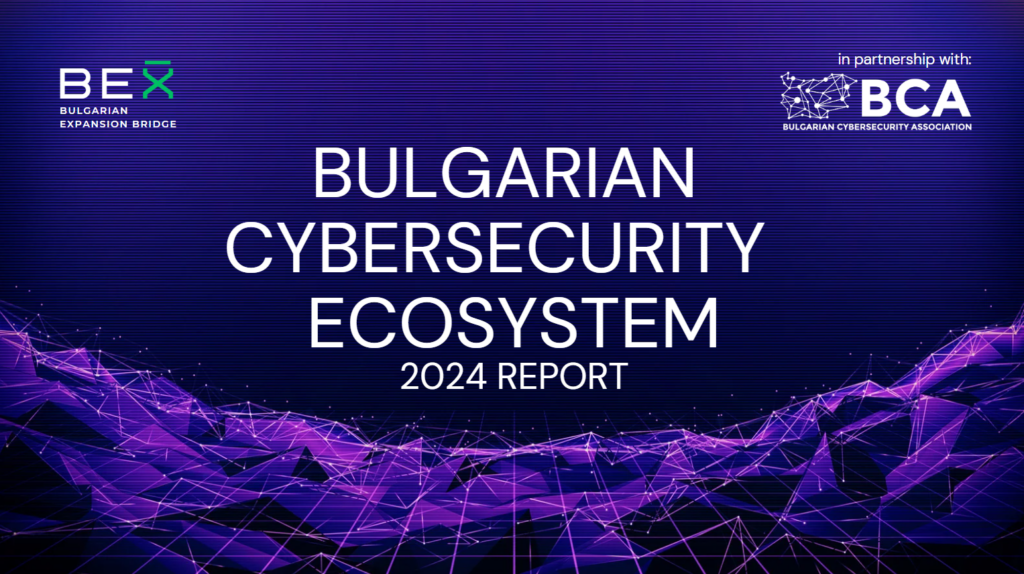The Bulgarian Cybersecurity Association (BCA), a collective member of the Union for Private Economic Enterprise (UPEE), as part of the efforts to develop and promote the cyber industry in Bulgaria, actively participated in the process of creating the first report outlining the parameters of the cybersecurity ecosystem with information on the leading companies engaged in the development and provision of products and services in the field of digital security. “The country’s strong track record in information technology outsourcing offers the potential, evident in the report, for further innovation and growth in the field of cybersecurity product development, reinforcing Bulgaria’s reputation as a hub for technological innovation,” said Miglen Evlogiev, Chairman of BCA.
The report is an initiative of the UK-based business accelerator “BEX” – Bulgarian Expansion Bridge”, which supports the expansion of Bulgarian technology innovators on the British market. “With its rich talent pool and dynamic community of startups, Bulgaria is in an excellent position to become a global leader in cybersecurity. We aim to focus attention on this burgeoning industry and create opportunities for international collaboration and growth,” commented Georgios Kolovas, BEX Managing Director. BEX’s next big initiative is related to organizing a BootCamp (pre-investment boot camp) for Bulgarian cybersecurity product startups, which will take place virtually at the end of November and in person in London in December this year.

Special attention is given in the report to the leading companies in the cybersecurity sector on the Bulgarian market, as well as to the NGOs and networks in the industry such as BCA, EDIH “Trakia” with coordinator UPEE – member of the European Cyber Security Organization, and the newest pan-European network with a presence in Bulgaria – Women4Cyber – Bulgaria. As noted in the report, the role of the NGO sector in the national cybersecurity ecosystem will be increasingly strengthened as NGOs provide the necessary cross-system linkages between the corporate, academic, and institutional sectors to build capacity in the industry and create the preconditions required for its development both nationally and internationally.
The Digital Innovation Hub Trakia, for example, in addition to the project “Cyber4All STAR” which provides free cyber-services for small and medium-sized enterprises in the country with the support of the Digital Europe Programme of the European Commission and the “PNIIDIT 2021-2027” of the Ministry of Innovation and Growth, has launched two new international projects by the end of the year that will connect Bulgaria with leading European organizations, universities and companies in the cybersecurity sector. In particular, the two new initiatives of EDIH Trakia appear to support the implementation of the new EU Cyber Resilience Act (CRA) and the newly established “Cybersecurity Skills Academy” under the auspices of the European Commission, which contributes to reducing the shortage of professionals in the sector.
The project “CyberSec4OT” is coordinated by Sabancı University (Turkey) and with the participation of the Plovdiv Digital Innovation Hub Trakia, the Digital Transformation Office of the Republic of Turkey, the Polytechnic University of Madrid, the National Technical University of Athens, and other partners. The initiative aims to increase the cyber resilience of industrial companies in the process of integrating Industry 4.0 technologies and to contribute to addressing the shortage of cybersecurity experts for monitoring and management systems by providing training in operational technology (OT) cybersecurity for individuals with technical and non-technical backgrounds. As part of the project activities, EDIH Trakia will be involved in developing training programs, providing theoretical and practical training such as “Penetration Testing of OT Systems”, “Malware Analysis and Incident Response for SCADA Systems” and other initiatives to increase understanding of OT cybersecurity challenges at all levels within the company.
The project “Open Source Cyber Resilience Tools Act” (OSCRAT) is coordinated by PMF Research (Italy) and involves EDIH Trakia from Bulgaria, the Polish EMAG Institute for Innovative Technologies, as well as corporate technology partners from Estonia – Unicis. Tech and Romania – Oves Enterprise, Enersec Technology, and others. The initiative is aligned and in line with the objectives outlined in the Cybersecurity Act, and is based on the development of tools that will support the compliance procedures of European SMEs with the new legislation. Project activities include the creation of tools for the automation of self-assessment and third-party assessment checklists; for Software Based Material Specification (SBOM); automation of the cyber security vulnerability management approach and the incident handling process. Project technologies will be offered as a free open-source solution to support Bulgarian and European entrepreneurs.

